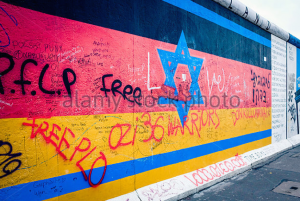Presented By: Judaic Studies
"Israeli Berlin: Jewish Culture in the German Capital, Then and Now"
Rachel Seelig, University of Michigan

West Bloomfield Lecture Series: Israel in the World
Every year, hundreds of Israelis migrate to Berlin, provoking heated reactions from Israeli critics who see moving to Germany, of all places, as an act of desertion. The intensity of the debate surrounding Israelis in Berlin today conceals the fact that Jewish migration to the German capital is not new. Roughly a century ago, Berlin emerged as a major metropolis and a magnet for Hebrew- and Yiddish-speaking writers from Eastern Europe who, like Israelis today, came in search of economic and artistic opportunity. This talk will explore the development of Israeli culture in Berlin through the lens of the past. How can the history of Hebrew and Yiddish culture in Weimar Berlin illuminate the current phenomenon of Israeli “diasporization”? What might this phenomenon tell us about Israeli identity today?
Rachel Seelig is a fellow at the Frankel Institute for Advanced Judaic Studies at the University of Michigan. She received her PhD from the University of Chicago in 2011 and has taught German Studies and Comparative Literature at the University of Toronto and the Hebrew University of Jerusalem. She is the author, most recently, of Strangers in Berlin: Modern Jewish Literature between East and West, 1919-1933 (University of Michigan Press, 2016). Rachel is currently co-editing a volume with Amir Eshel entitled The German-Hebrew Dialogue: Studies of Encounter and Exchange, which will be published by De Gruyter Press in 2017.
Sponsored by: Frankel Institute for Advanced Judaic Studies and JCC's Seminars for Adult Jewish Enrichment
Every year, hundreds of Israelis migrate to Berlin, provoking heated reactions from Israeli critics who see moving to Germany, of all places, as an act of desertion. The intensity of the debate surrounding Israelis in Berlin today conceals the fact that Jewish migration to the German capital is not new. Roughly a century ago, Berlin emerged as a major metropolis and a magnet for Hebrew- and Yiddish-speaking writers from Eastern Europe who, like Israelis today, came in search of economic and artistic opportunity. This talk will explore the development of Israeli culture in Berlin through the lens of the past. How can the history of Hebrew and Yiddish culture in Weimar Berlin illuminate the current phenomenon of Israeli “diasporization”? What might this phenomenon tell us about Israeli identity today?
Rachel Seelig is a fellow at the Frankel Institute for Advanced Judaic Studies at the University of Michigan. She received her PhD from the University of Chicago in 2011 and has taught German Studies and Comparative Literature at the University of Toronto and the Hebrew University of Jerusalem. She is the author, most recently, of Strangers in Berlin: Modern Jewish Literature between East and West, 1919-1933 (University of Michigan Press, 2016). Rachel is currently co-editing a volume with Amir Eshel entitled The German-Hebrew Dialogue: Studies of Encounter and Exchange, which will be published by De Gruyter Press in 2017.
Sponsored by: Frankel Institute for Advanced Judaic Studies and JCC's Seminars for Adult Jewish Enrichment